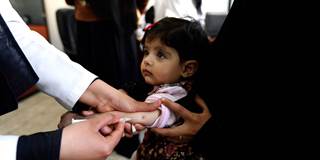During the last couple of decades, international donors have invested billions of dollars in national disease-control programs and health systems, saving millions of lives. But now some of the countries that have benefited from such investments face a new challenge: how to sustain their gains after external support is withdrawn.
WASHINGTON, DC – The first years of this century have been heady ones for global health. International donors – whether national governments, such as the United States, through its PEPFAR program, or new international funding initiatives, such as the Global Fund to Fight AIDS, Tuberculosis, and Malaria and Gavi, the Vaccine Alliance – have invested billions of dollars in national disease-control programs and health systems, saving millions of lives.

WASHINGTON, DC – The first years of this century have been heady ones for global health. International donors – whether national governments, such as the United States, through its PEPFAR program, or new international funding initiatives, such as the Global Fund to Fight AIDS, Tuberculosis, and Malaria and Gavi, the Vaccine Alliance – have invested billions of dollars in national disease-control programs and health systems, saving millions of lives.